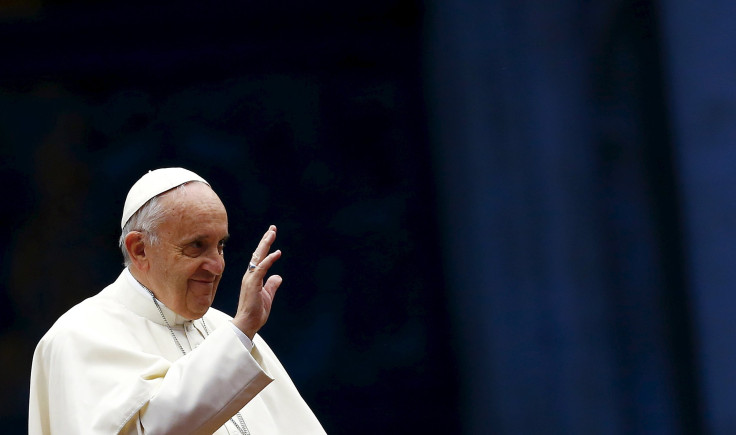Pope Francis’ Long-Awaited Document ‘Joy Of Love’ May Open Doors For Communion To Remarried Divorcées

UPDATE: 6:38 a.m. EDT — Pope Francis urged Roman Catholics on Friday to take a relatively lenient position on whether to admit divorced and civilly remarried Catholics to Holy Communion. His appeal for a more compassionate response to the divorced, as well as gay and lesbian believers, came in a long-awaited document entitled “Amoris Laetitia,” or “Joy of Love.”
The document shared the pope's view on family life, marriage, contraception and raising children. It reflects about two years of consultations with bishops and other church leaders on how to appeal unchanging Roman Catholic dogma in an increasingly secular world.
“I understand those who prefer a more rigorous pastoral care that leaves no room for confusion,” he wrote. “But I sincerely believe that Jesus wants a church attentive to the goodness which the Holy Spirit sows in the midst of human weakness.”
Francis made no changes in church doctrine but insisted that more compassion must be shown towards "imperfect" Catholics, such as those who divorced and remarried.
“No one can be condemned forever, because that is not the logic of the Gospel! Here I am not speaking only of the divorced and remarried, but of everyone, in whatever situation they find themselves,” the pontiff stated.
The document, which runs to more than 60,000 words, was signed March 19.
The pope wrote that the Roman Catholic church makes it “hard to make room for the consciences of the faithful, who very often respond as best they can to the Gospel amid their limitations, and are capable of carrying out their own discernment in complex situations. We have been called to form consciences, not to replace them.”
He warns against treating the divorced in “overly rigid classifications” that pre-empts pastoral prerogatives about admitting such persons to the sacrament of Holy Communion.
Francis further calls on priests and bishops to undertake “responsible personal and pastoral discernment of particular cases, one which would recognize that, since ‘the degree of responsibility is not equal in all cases,’ the consequences or effects of a rule need not necessarily always be the same.”
Regarding families with members with “homosexual tendencies,"”the document reaffirms the “necessity to respect them and to refrain from any unjust discrimination and every form of aggression or violence.”
Original Story:
Pope Francis is expected to make public a document about the conclusions of his two synods on the family Friday. The document “Amoris Laetitia,” or “Joy of Love,” will reportedly detail the pope’s views about family life, marriage, contraception and bringing up children, while many people also hope that it may pave the way for the church to offer communion to remarried divorcees.
The document, which is eagerly awaited by 1.3 billion Roman Catholics, is the culmination of three years' work by the Pope. It will highlight the pope’s views on a series of arguments about family that were debated at divisive synods in 2014 and 2015. Conservative bishops have reportedly warned that a change in the doctrine would weaken the Roman Catholic Church.
Some in the church have suggested that measures should be taken to allow a priest or a bishop to decide privately if a Catholic, who has divorced and remarried, can be fully readmitted and receive communion, BBC reported.
The progressives, such as the influential Cardinal Walter Kasper of Germany, have supported this policy, but conservatives have maintained that this would devalue the principle established by the church.
According to the Los Angeles Times, experts have said that the pope’s new document may draw a middle path between the Catholic conservatives and liberals, a decision that might not be satisfactory for neither side.
While working on the more than 200 pages of the “Joy of Love,” the pontiff sent questionnaires to families across the world asking them about their hopes and difficulties. He later brought bishops and cardinals together for two synods in Rome, where he encouraged them to debate and even to disagree over issues — including communion for the divorced and remarried, contraception and the treatment of Catholics who are gay — that divide the church in many countries.
“Conservatives want to say church teaching will never change, while progressives want pastoral problems to be addressed with compassion, and they want Communion for remarried divorcees,” Father Tom Reese, an analyst with the National Catholic Reporter, said according to the LA Times.
© Copyright IBTimes 2024. All rights reserved.





















